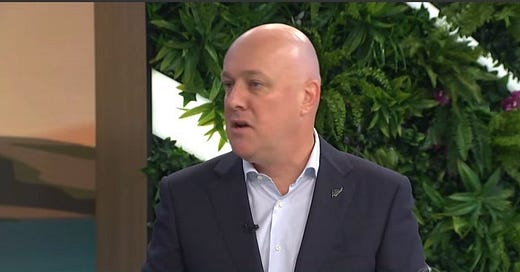Education and upward mobility won't end poverty, only sustain it / A.J. Hendry
In a recent interview on the Breakfast show, Christopher Luxon, the newest leader of the National Party made the case that the way to move people out of poverty was by encouraging social mobility. Provide more opportunities, ensure our young people get education, that sort of thing.
Luxon isn’t a bad communicator, and as he spoke you could hear that he was trying to convey the empathy and heart behind his political values.
At the end of the day, if we’re honest with one another, no one wants to see children suffering from poverty, or parents wracked with guilt and anguish because they don’t have enough pennies to rub together to provide their children with a decent meal.
The problem with Luxon (and National’s) plan, however, is that it involves people remaining in poverty.
As Max Rashbrooke said on Twitter in response to Luxon’s interview, “Education shouldn’t be the solution to poverty, as there shouldn’t be any poverty in the first place”. Rashbrooke speaks of this further in his book, Too Much Money, and goes on to point out a fairly obvious fault with this line of thinking. Which is basically, if by education you raise a group of kids out of poverty into higher paying jobs, but do nothing to raise wages, than this only means that someone else’s kids will end up in those lower paying jobs, remaining in poverty as a result. The solution to poverty, he argues, is not upward mobility, but rather that all jobs are paid a decent wage, and that benefits are liveable.
Now, I don’t for a moment believe that Luxon wants anyone to remain in poverty and to have to live in and experience the sort of trauma and horror that can result from such an experience. However, as he spoke with John Campbell on the breakfast show, and expressed his concern that alleviating poverty was one of those big issues that successive governments had just failed to respond adequately to and find a solution for, I couldn’t help but thinking how unhelpful the narratives he was advancing are to achieving our collective goal.
I also couldn’t help but thinking that a lot of what he discussed was much of the same. Opportunity, education, upward mobility, trickledown economics. We’ve heard this all before. Perhaps, rather than repeating the same mistakes of our past, let’s take a different approach. What if we raised the benefit so that anyone who needed it could live a full and decent life, regardless of their situation? What if we ensured that no matter what job you did, from cleaning floors, to packing grocery stores, you were able to take home enough pay to feed your family, and keep a roof over your head?
It's not enough just to continually raise one group out of poverty, for another to simply take their place. The goal should be to eradicate poverty all together.
I completely appreciate the concern about balancing the needs of the economy, and supporting small businesses, but something we’re missing in this conversation is the manner in which inequality and poverty impacts all of us. According to Kate Pickett and Richard Wilkinson, epidemiologists, and authors of the Spirit Level (a book exploring our inequality impacts on our society at large), countries with greater inequality had poorer health outcomes, more crime, and larger social issues, than more equal countries. And these poor outcomes weren’t just felt by the poor, they were experienced by all people at all levels of society. Even the wealthiest.
We are connected to each other, and when anyone in our whānau suffer, we all suffer.
It was encouraging to hear Luxon acknowledge that we do not have equality of oppurtunity in Aotearoa. That’s a start. Recognizing that the myth of meritocracy is dead is a positive step forward. However, if we truly want to address poverty and inequality, we need to do away with the narrative that places higher education as the solution to poverty. Is it really our goal to support some individuals to rise above their experience of poverty, only for others to take their place?
Are we really happy with poverty being a fixed reality within our communities?
Or do we want to eradicate it completely?
A.J. Hendry is a Laidlaw College graduate, and now a Youth Development Worker and housing advocate, working in the Youth Housing and Homelessness space. He leads a service supporting rangatahi experiencing homelessness and is also an advocate working collectively to end youth homelessness in Aotearoa. He is also the curator and creator of When Lambs Are Silent.
Though we try to keep up with all our comments and feedback, we do sometimes struggle to monitor all platforms. If you do want to engage in the conversation join us on facebook and find the relevant post or connect directly with A.J on his facebook page here, twitter here, or Instagram here.




